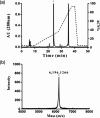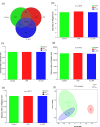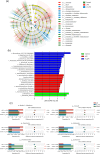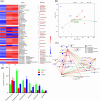Latroeggtoxin-VI improves depression by regulating the composition and function of gut microbiota in a mouse model of depression
- PMID: 40202502
- PMCID: PMC12282306
- DOI: 10.1099/jmm.0.001977
Latroeggtoxin-VI improves depression by regulating the composition and function of gut microbiota in a mouse model of depression
Abstract
Introduction. Depression has become one of the mental diseases that seriously affect human health. Its mechanism is very complex, and many factors influence the condition. An imbalance of the gut microbiota is being considered as a factor that impacts the occurrence and progression of depression. Future therapies may therefore tap into this connection, treating depression through manipulation of the gut microbiome.Hypothesis/Gap Statement. Latroeggtoxin-VI (LETX-VI), a proteinaceous neurotoxin from Latrodectus tredecimguttatus eggs, was previously demonstrated to inhibit excessive inflammation and improve depression behaviours, suggesting that it might be able to regulate the balance of gut microbiota. The aim of this study was to explore the effects of LPS and LETX-VI on depressive behaviours and gut microbiota and to analyse correlations between changes in the gut microbiota and depressive behaviours.Methodology. A murine model of depression was established, and the effects of LPS and LETX-VI treatment on depressive behaviours and gut microbiota were investigated.Results. In the murine model, depressive behaviour was induced by LPS; the ratio of Firmicutes to Bacteroidetes (F/B) and the number of pro-inflammatory bacteria in the gut microbiota increased (P<0.01), while butyric acid-producing bacteria with anti-inflammatory effect decreased (P<0.05). Furthermore, the metabolic function of the gut microbiota was disrupted, and the level of virulence factors among gut microbiota was up-regulated (P<0.05). Association analysis showed that the changes in the composition and function of gut microbiota were closely related to the depression phenotype of mice, suggesting that the abnormal function of gut microbiota is linked to depression. However, when LETX-VI was applied before LPS injection, the LPS-induced changes in the gut microbiota were alleviated, and the depressive behaviour greatly improved.Conclusion. LETX-VI can prevent depressive behaviour by regulating the composition and/or function of the gut microbiota.
Keywords: depression; depression mouse model; depressive behaviour; gut microbiota; latroeggtoxin-VI.
Conflict of interest statement
The authors declare that the research was conducted in the absence of any commercial or financial relationships that could be construed as potential conflicts of interest.
Figures









References
MeSH terms
Substances
LinkOut - more resources
Full Text Sources
Medical
Miscellaneous

